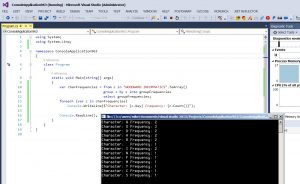(String) letter frequency in LINQ
How would you determine the frequency of letters in a string using C#? If your mind naturally wandered down some abstruse solution involving loops and 2D arrays containing the ASCII code of the letter and a value for the letter frequency and so on, albeit briefly, and you proffer your skills as a C# developer, then your skills are close approaching being a decade out of date.
Every time I see this type of code construct, and it is very often, I unilaterally make the decision to clean-it-up and do it properly. Properly to me means LINQ. The functionality is bordering on trivial in LINQ too – just look at the code below:
using System;
using System.Linq;
namespace ConsoleApplication963
{
class Program
{
static void Main(string[] args)
{
var charFrequencies = from c in "WOODWARD INFORMATICS".ToArray()
group c by c into groupFrequencies
select groupFrequencies;
foreach (var c in charFrequencies)
Console.WriteLine($"Character: {c.Key} Frequency: {c.Count()}");
Console.ReadLine();
}
}
}
Of course LINQ is so much more powerful than I have demonstrated in this small example, and there is a great 101 examples resource available from Microsoft demonstrating so much more too, but for some reason many developers insist on reinventing the wheel with a buggy for loop and arrays and a bunch of if statements for the edge-cases and so on.
Of course the world hasn’t stood still since the availability of LINQ just under a decade ago (I dwell on LINQ as it’s just a hobby horse for me), just look at the proposed C#7 feature list ! Things are and continue to move fast in .NET “land”; it’s frightening.
— Published by Mike, 20:12:12:31 04 September 2016
Archive
By Month: November 2022, October 2022, August 2022, February 2021, January 2021, December 2020, November 2020, March 2019, September 2018, June 2018, May 2018, April 2018
Categories
Apple, C#, Databases, Faircom, General IT Rant, German, Informatics, LINQ, MongoDB, Oracle, Perl, PostgreSQL, SQL, SQL Server, Unit Testing, XML/XSLT

Leave a Reply